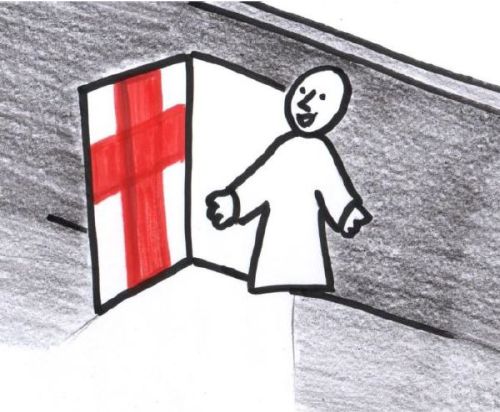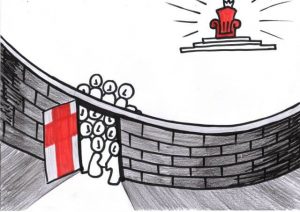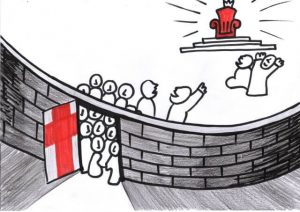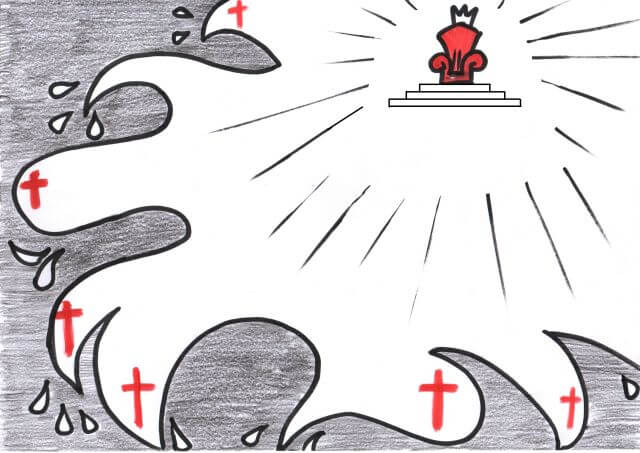CHURCH 20 - Gospel, Salvation & the Kingdom of God
What exactly is the gospel?
Though the gospel is a key word widely used in the church, its definition is not as easy to give as first thought. What exactly is the gospel?
- We use the word ‘the Gospel’ to refer to Matthew, Mark, Luke and John’s writings about the life of Jesus.
- We use the word as a summary statement of Christ’s message.
- We use the word as a summary statement of what needs to be spread, preached, taught: What do we preach? The gospel. What is the Bible all about? > the gospel
But what is the gospel? If you ‘share the gospel’ what do you actually say? Some typical answers:
- The birth, death and resurrection of Jesus
- “one beggar telling another where food is available”
- Four spiritual laws:
- 1 God loves you and want relationship with you.
- 2 Our sins separate us from God.
- 3 Jesus died on the cross to atone for our sins.
- 4 believe and receive Jesus to obtain salvation.
- Or the four color gospel: White = God is holy. Black = Humans are sinful. Red = Jesus died for our sins. Gold = through salvation we have assurance of heaven.
If I had to summarize it in one word what would I say?
- The gospel is about how to receive salvation. Or more popularly: The gospel is the answer to the question: How do I get to heaven?
Challenging our paradigm
- All good so far. The gospel is about salvation. We tell people how they can receive salvation.
- We even have a theological term for the study of salvation: it is called “soteriology”.
Word Study of "salvation" ('soteria' in Greek) in the New Testament
If we do a word study on the word “soteria” in the New Testament, here is the surprising result:
- In Matthew and Mark the word “soteria” (salvation) isn’t mentioned at all, in John is mentioned once, in Luke it is mentioned 5 times. A meager 6 mentions in all four gospels together, and in all four gospels we find Jesus takes the “soteria” into his mouth a mere three times!
- Of course, if one adds the verb “to save” and other related terms, the number of mentions is somewhat higher, but this is still a very disturbing result: We think the gospel is all about salvation, and we barely even find the word.
- Another interesting thing to consider: When the disciples (the twelve and the seventy) are sent out by Jesus, what exactly do they preach?
- Jesus gives instructions about what to bring and not to bring and what to do when entering a village (Mth 10:8-23, Mrk 6:8-11, Luk 9:3-5, 19:1-12) … but what exactly does he tell them to preach?
Mth 10:7 “As you go, proclaim the good news, ‘the kingdom of heaven has come near (‘is at hand’) Cure the sick, raise the dead, cleanse the lepers, cast out demons.’”
Mrk 6:6-7,12-13 ‘Then he went about among the villages teaching. He called the twelve and began to send them out two by two, and gave them authority over the unclean spirits … So they went out and proclaimed that all should repent. They cast our many demons, and anointed with oil many who were sick and cured them.”
Luk 9:1-2 “Then Jesus called the twelve together and gave them power and authority over all demons and to cure diseases, and he sent them out to proclaim the kingdom of God and to heal.”
Luk 10:9 “Cure the sick who are there, and say to them, ‘The kingdom of God has come near to you (or: ‘is at hand’).”
- These passages are parallel. The proclamation is:
- the kingdom of God is near!
- repent!
- believe!
- It says that what they are preaching is the gospel, but what we would call “preaching the gospel” today they can’t have preached because:
- Jesus has not died yet
- he has not risen yet
- and forgiveness of sins is not yet accomplished.
What then did the disciples preach?
- What exactly did they preach? The words “salvation”, “forgiveness of sins”, “going to heaven” are nowhere to be found.
- If we look at the verses again the answer is clear: the key word is not salvation, but “the kingdom of God”.
- If one does a word search on “kingdom” as compared to “salvation”, here is the result:
Matthew Mark Luke John Acts
Salvation “Soteria” 0x 0x 5x 1x 5x
Kingdom “” 56x 21x 45x 5x 8x - So to say it a bit bluntly: They preached the kingdom. We preach salvation.
- Now of course the two are linked. But it still should shock us a bit.
How about Jesus?
- Mark summarizes Jesus’ preaching like this:
Mrk 1:14-15 ‘Now after John was arrested, Jesus came to Galilee, proclaiming the good news of God, and saying, “The time is fulfilled and the kingdom of God has come near; repent and believe in the good news.’
- From Jesus – when he preaches the gospel – we get the exact same picture: the key issue he preached was “the kingdom”.
- What does it mean to preach the kingdom? Before we answer this question, let’s look at word “gospel” itself in the New Testament:
Use of the word "gospel" (Greek ‘euaggelion’) in the New Testament
- Here is the list of all uses of the word ‘euaggelion’ in the New Testament, 77 times in total:
Gospels Mth 4x, Mrk 8x, Luk —, Jhn —
Acts Acts 2x
Paul’s letters Rom 10x, 1 Cor 8x, 2 Cor 8x, Gal 7x, Eph 4x, Php 9x, Col 2x, 1 The 6x, 2 The 2x, 1 Tim 1x, 2 Tim 3x, Tit —, Phm 1x
Other letters Heb —, Jam —, 1 Pet 1x, 2 Pet —, 1 Jhn —, 2 Jhn —, 3 Jhn —, Jud —
Revelation Rev 1x
Paul uses ‘euaggelion’ frequently in his letters, Peter uses it once, John once in Revelation. Surprisingly only two gospels use the word, and even there with less frequency than one would suspect. Even Acts uses it only two times.
The meaning of the word 'Euaggelion' or 'Gospel'
- In Greek the word ‘Gospel’ is Strong’s Number G2098, in English letters ‘euaggelion’.
- This word is a combination of ‘eu’ (a positive prefix) and ‘aggelion’ (the word ‘message’ or ‘news’. The word ‘angel’ (which means ‘messenger’) is from the same root.
- So, as it is often correctly translated, ‘euaggelion’ simply means ‘positive message’ or ‘good news’. From this root we also get the modern terms ‘evangelism’ or
- But: the word euaggelion was not originally a Christian word at all. It is a “secular” word that was commonly used by the Roman government.
'Euanggelion' as used by the Roman government
- In 27 BC the Roman Augustus defeats his rival and seizes the throne, becoming the emperor Augustus, during who’s reign Jesus is born.
- When he seizes power and ascends the throne, he has that proclaimed throughout the Roman empire by “evangelists” who proclaim the “euanggelion”, which was: Augustus is king! And they would praise him and list all the benefits the people would have from his reign.
- This is not unlike modern nations where the newly elected prime ministry declares his victory.
- Of course Augustus coming to power was not necessarily good news to all people, it was bad news for those who had opposed him, but that was no longer important. He was the new Lord, and the world had to adjust.
- So the proclamation of the euanggelion was the proclamation of a change in government, or a new king in power.
- It was informing people of a new reality, like it or not. They could accept the new king, or go into opposition, but he was on the throne, and actions would have consequences.
Christians usurp the word
- So the gospel writers basically seized a government word and used it to declare the enthroning of a totally different king: Jesus.
- When Mark says in the beginning of his writing (Mrk 1:1): “The beginning of the good news of Jesus Christ”, this is not just an introductory remark, this is a totally bold saying: not the Roman Caesar but Jesus himself is the Lord of the world!
To proclaim the gospel = to proclaim a change in government

- So: “The kingdom of God is near”. And (and in about as many verses): “The kingdom of God is here”.
- Jesus has comes. He reigns. He has started to reign. And his reign will expand much further in the future.
- Notice the combination of “proclaiming the kingdom” and the command to “believe!”.
- This should not surprise us: We are told the new reality: Jesus is King. We need to respond to this new reality. In the light of this reality we need to change our thinking and our priorities.
- Notice the combination of “proclaiming the kingdom” and “healing”, “casting out demons” even “raising the dead”. This combination should not surprise us: Jesus’ reign is here, and he by his authority sends the demons flying and overcomes sickness and death. Where he reigns sickness and death can’t last. Where he reigns there is life and freedom.
- Also the combination of “proclaiming the kingdom” and the command to “repent!” makes perfect sense: If Jesus indeed reigns, then this has vast implications for our lives: everything must change. Everything must obey him.
Is this borne out by the preaching of first church in Acts?
Peter’s Pentecost sermon
Acts 2:14-21 Peter quotes Joel 2 to explain tongues, to bring in: ‘everyone who calls on the name of the Lord shall be saved’
Acts 2:22-24 Peter recalls Jesus, his signs, attestation by God, his death according to God’s plan, and his resurrection.
Acts 2:25-35 Peter quotes Psalm 16 to explain that Jesus resurrection happened as predicted (God’s Holy One not seeing corruption).
Acts 2:36 Peter concludes: ‘Know with certainty that God had made him both Lord and Messiah, this Jesus whom you crucified.’
- Peter proves (by eye witness evidence and Old Testament quote) that Jesus is Lord and Messiah.
Peter’s preaching in the temple
Acts 3:12,16 Peter explains that the lame man got perfectly healed not by their own power or piety, but by faith in the power of Jesus.
Acts 3:13-15 Peter recalls Jesus’ verdict, death and resurrection and interprets that ‘God has glorified his servant Jesus’, whom he calls ‘the Author of life’.
Acts 3:17-25 All happened as predicted in the prophets: the Messiah was to suffer, Moses predicted a prophet like him, through Abraham’s descendants all families of the earth shall be blessed.
Acts 3:19 Conclusion: ‘repent so that your sins might we wiped out’, that ‘times of refreshing may come’.
- Jesus is Lord, therefore do repent, for there is no forgiveness outside of Jesus.
Peter and John’s preaching before the Sanhedrin
Acts 4:8-10 Healing of the lame man (eye witness evidence) through Jesus name
Acts 4:10-11 Jesus was crucified, resurrected by God, the rejected cornerstone OT
Acts 4:12 Conclusion: ‘salvation in no one else’, ‘no other name under heaven’.
- Jesus is power, he is the cornerstone, the Savior, the one name to worship.
Peter and Apostles’ preaching before the Sanhedrin
Acts 5:29 Apostles ‘must obey God rather than men.’
Acts 5:30-31 You crucified Jesus, God raised him up, exalted him at his right hand as Leader (Chief, ‘Arche’) and Savior.
Acts 5:32 We are witnesses and the Holy Spirit also (given to those who obey him)
- The apostles are fearless in claiming Jesus as authority over the world, their lives and above the Sanhedrin.
Stephen’s preaching before the Sanhedrin
Acts 6:12-15 Charge: speaking against holy place and law (Jesus will destroy it)
Acts 7:2-50 Retelling of Israel’s history: Abraham to Solomon as temple builder
Acts 7:51-53 Conclusion: stiff-necked, opposing the Holy Spirit, killing prophets and the Righteous one
- They intentionally use false witnesses. Stephen doesn’t even call for them to repent, nor for himself to receive mercy. Rather he simply claims Jesus’ Lordship and dies for this claim.
Peter preaching at Cornelius’ house
Acts 10:34-36 Peter starts with the conclusion: Jesus is Lord of all (also Gentiles)
Acts 10:37-43 Peter summarizes Jesus’ life, signs, death, resurrection, ordained by God as judge over all, as the one name by which forgiveness is possible.
- Summary of Jesus’ life, concluding he is Lord of all (also of all Gentiles!). Peter here obeys the Holy Spirit rather than tradition or perceived orthodox theology.
Paul’s preaching in the synagogue in Antioch
Act 13:16-22 Retelling Israel’s history till David.
Act 13:23-25 Conclusion: David’s descendant Jesus is the promised Savior, John the Baptist also witnessed to this.
Act 13:26-37 Jesus’ death, resurrection. Proof by witnesses and Old Testament quotes (Psa 2, Psa 16): No corruption prophecy fulfilled in Jesus’ resurrection.
Act 13:38-41 Through Jesus forgiveness. Believe, don’t scoff!
- Jesus is the fulfillment of Old Testament prophecy, he is the promised Savior and Lord, therefore believe!
Paul’s preaching to idolatrous Greeks in Lystra
Act 14:15-17 Healing performed by apostles, but they are mortals. God is Creator, gracious. Turn from worthless things to the living God
- When in idolatrous areas with no Old Testament background, Paul starts with Gen 1: God is Creator, God is good and generous. He has every claim on your life. Honor him!
Paul’s preaching in Athens
Act 17:22-23 Hook: the altar ‘to an unknown God’
Act 17:24-28 God is creator, not honored by shrines. He gives life, made nations from Adam, gives existence, boundaries, reveals himself to the seeking
Act 17:29-31 times of ignorance are over, by Jesus the world will be judged. Jesus is confirmed by resurrection.
- When in philosophical, idolatrous surroundings with no Old Testament background, Paul is using hooks or bridges, is of an affirming attitude, brings in Genesis. Jesus is Judge and Lord, worship him, not idols.
- In Summary it can be said: Though with different situations and audiences the preaching differs somewhat, but a pattern emerges:
- Jesus’ historicity his life, signs, death, resurrection
- proofs eye witnesses, fulfillment of Old Testament prophecy
- resulting claim Jesus is Lord (He gives life, has power and legitimate authority)
- Jesus is Savior (forgiveness only through him)
- Therefore: repent! Believe! Make him Lord of your life!
Paul’s defining the gospel in 1 Corinthians 15
- Paul in his first letter to the Corinthians gives a description of what the gospel is. He starts the passage off:
1 Cor 15:1-3 ‘Now I would remind you, brothers and sisters, of the good news that I proclaimed to you, which you in turn received, in which also you stand, through which also you are being saved, if you hold firmly to the message that I proclaimed to you – unless you have come to believe in vain. For I handed on to you as of first importance what I in turn had received:
- good news = proclaimed truth = basis for salvation … this is what is received and passed on
1 Cor 15:3 ‘that Christ died for our sins in accordance with the scriptures’
- forgiveness of sins through Jesus alone
1 Cor 15:4-23 ‘and that he was buried, and that he was raised on the third day in accordance with the scriptures, and that he appeared to Cephas, then to the twelve…’
- reality of Jesus’ resurrection
1 Cor 15:24 ‘then comes the end, when he hands over the kingdom to God the Father after he has destroyed every ruler and every authority and power. For he must reign until he has put all enemies under his feet…’
- Kingdom = Lordship of Jesus Christ
Paul’s definition of what the Gospel is, is totally consistent with the gospels and the preaching in Acts: The Gospel means Jesus’ resurrection is real. Through the resurrection God has made him both Savior (forgiveness) and Lord (kingdom).
Not only Salvation but the Kingdom
- We have so concentrated on ‘being saved’, on ‘getting salvation’ and ‘going to heaven’ that we have missed the message about the kingdom.
- We have forgotten that salvation is not the goal, it is simply the necessary start for a life in the kingdom.
- Salvation undoes the fall. God started out with us, then we fell, now he has saved us so we are up here again … but now what?
- Salvation is the starting point, it is putting us back on track, putting us back in relationship with the Father. With Jesus in our hearts, and the Holy Spirit to help us we are re-adopted as sons of the Father … but as sons, now what do we do?
- Said differently: Salvation is the beginning of a new life, a life that will go on for ever, that will grow and develop forever. We will for ever grow in our relationship with Christ. We will forever know him more. We will forever become more like him.
- Illustration: We focus on the door, then crowd around the door.
- Jesus is the door. There is no other way into the kingdom. There is no other name by which we will be saved. But he is not only the door, he is the king!
- Do not crowd the door, do not dance on the threshold! We have entire shelves of theology books written about whether one can lose one’s salvation or not.

- Why would you want to lose it? Why do you dance on the threshold? Why do you ask how much sin you can get away with and not lose salvation? This means to totally miss the point.
- So yes, remember that only by Jesus you got in, but now ask: Where is my king? How is he like? What does he want? How does he run his kingdom?


- Salvation is really the starting point to a different life, a life in the kingdom. He not only wants us saved, he wants us fully alive, fully changed, fully obedient and reigning with him.
What is the Kingdom of God?
What does “the kingdom” mean?
- A kingdom means a realm reigned by a king
- So the kingdom of God = where God reigns.
So where is the Kingdom of God?
- Wherever God reigns. Where God’s will is done. Wherever God is honored.
- Wherever God is obeyed, he reigns, and there his kingdom is.
- So in that sense: If we are obedient to God, if we yield your heart to him, his Kingdom is in our hearts. Our heart has become part of ‘the Kingdom of God’, our heart has become the kingdom.
- If we live by his principles, his kingdom is present in our lives. If we act in the world by his will, we are spreading his kingdom.
- Spreading the kingdom is not primarily an issue of preaching. We say: ‘I preach the gospel, so I spread the Kingdom of God’. That is true and good. But if our actions are not aligning with God’s will, if we are not obeying God in every daily thing, we can preach whatever we want, but it will not spread his kingdom.
- On the other hand: if we obey his will, we spread his kingdom whether or not we talk. If we treat people fairly, if we do not cheat, if we are faithful in our job, we spread God’s reign. For:
- Wherever God is obeyed, his kingdom is. But also: wherever he is not obeyed, there his kingdom is not.
- One can be a revered person, leading big spiritual meetings, talk in the name of God, and still not really do what God says. If we are concerned with our honor, if we are resentful of other leaders, if we do politics, we do not advance his kingdom.
- Each time we forgive, we advance God’s kingdom. Each time we don’t forgive, we set back God’s kingdom. Each time you speak the truth, you advance God’s kingdom. Each time you lie you advance Satan’s kingdom. He is the father of lies.
- If we lie and advance Satan’s kingdom, this doesn’t mean we have lost our salvation, but it still is so: If am gracious and humble, I advance God’s kingdom. If I am easily offended and resentful, I build Satan’s kingdom.
- Him whom we obey, him we let reign over us. Or to say it with Paul’s words: “Do you not know that if you present yourselves to anyone as obedient slaves, you are slaves of the one whom you obey?” or again “No longer present your members to sin as instruments of wickedness, but present… your members to God as instruments of righteousness” (Rom 6:16, 6:13).
- This is why every little faithfulness is so crucial. This is why even the very little unfaithfulness is so destructive. So whose kingdom are we building?
Changed Life, kingdom life

- This is clear from multiple Bible passages: salvation means a changed life. Or: salvation must result in a changed life.
- For God wants us to be like him. He made us in his image. He wants us to be his children, his representatives, his heirs, his ambassadors, his co-regents.
- If we keep being what we are now – people of small thoughts, mostly selfish, not very trustworthy, not very giving, mostly concerned with our own advantage and pleasure – how can God give leadership to somebody like that?
- We need to change. And that is a demand of God, it is a dream of God, but also it is a promise of God: change is possible. He will do it. This is a challenge: to have hope for true change.
- Honestly, who would want to remain exactly like they are now for the rest of their life? Would you want a leader that is exactly like you are now? Would you want heaven filled with people who are exactly like you now?
But change to what?
- To obedience. To doing the will of God from our hearts.
- So often we resent God for his commands. We think: He is the boss, so he can make the rules. But we resent his commands. We resent being measured against something we feel we can’t reach. We resent God because we feel he sets up to fail? Why is everything fun forbidden?
- The reason that we think like that is because we have not yet understood who he is and how he is and how good his law is.
- He never makes a rule, just to test us, or tempt us, or to just see whether we are obedient. He never forbids for the pleasure of prohibition, power and control. He is never arbitrary or changing in what he forbids. Nothing that is good is ever forbidden by God. He only forbids what is bad, what is destructive, what kills life.
- But maybe we haven’t understood yet very well why and how it is destructive. And nobody has helped us understand it – frankly – most of our preaching is on what to do or not do, not why to do or not do it. That’s why we resent it.
- But he really is goodness. He is selfless love. He has no joy in forbidding anything. He is good and he commands good, nothing but what is good for you and for those around you. You cannot possibly bring onto yourself something better than what God already wants to give to you.
Bringing the kingdom here
- So we need to preach salvation which brings us into the kingdom. Then we need to not crowd the door but look at our king. And we need to become like our king.
- But even that view of the kingdom is not yet the full picture. It is us being saved, finding ourselves in the safe realm of God, having thankfully left the world behind us. We end up with a picture of the kingdom of God = heaven = escape from the world.
- But God says “His kingdom will come” or “has come”. Where? Here, on earth.
- He teaches us to pray: “Thy kingdom come, thy will be done on earth as it is in heaven.”
- We need to bring his kingdom down to earth. We need to establish God’s reign here.
- Heaven is fine. There he already reigns. But earth is the battle ground. Earth is what we need to bring under his reign. Starting with our own lives and keeping going with our communities and this good world.
- The picture of the kingdom is not one of a ‘save haven in heaven’, but of a kingdom of God that will conquer the darkness down here.

Conclusion
- In the New Testament the gospel is not called the ‘gospel of salvation’, it is called ‘the gospel of the kingdom’.
- The gospel proclaims that ‘the kingdom is at hand’. It proclaims that King Jesus has come to establish God’s kingdom on earth, here and now. He came to show us how his kingdom works (sermon on the mount). He has given signs to prove it is of God (miracles). He has modeled it in both his life and his sacrificial death.
- God resurrected Jesus and has thus made him both Savior (in his name alone is forgiveness and salvation) and Lord (he alone is worthy and has legitimate authority to rule over everything).
- So respond: repent and believe! Enter the kingdom! then live in the kingdom – here and now, not just after going to heaven!
- Ask: Who is my king? What is he like? What does he want? How does he think? How does he work? How can I join? How can I spread his kingdom? What can I bring under his good rule? How will it look when his will is being done? In everything? … We only very partially can answer these questions. Far more Bible study is needed here.
Heaven is where God reigns. “Thy kingdom come, on earth, as it is in heaven.”